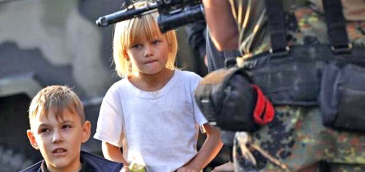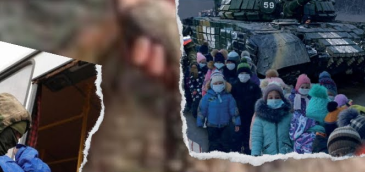Russia’s occupation authorities in the temporarily occupied territories of Ukraine have been systematically deporting the Ukrainian population to the Russian Federation since the onset of the full-scale war. This war crime of forced deportation affects both adults and children, with Russia allocating funds to continue it.
According to the UN, over 2.8 million Ukrainians have been deported to the Russian Federation since the war began. Dariia Herasymchuk, the Presidential Commissioner for Children’s Rights and Child Rehabilitation of Ukraine, emphasized that the number of deported Ukrainian minors could be between 200,000 and 300,000. Of these, only 19,546 children have been identified, with 388 successfully returned. Children, as a vulnerable social group, are a primary target of Russia’s deportation policy due to their susceptibility to re-education and sensitivity to propaganda and disinformation. The return of these abducted Ukrainian children from Russia is further complicated by forcibly adoptions by Russian families and the granting of Russian citizenship, despite the presence of parents or guardians at home. Additionally, there are reports of Russia militarizing and Russifying deported minors to erase their Ukrainian identity. There is somebody financing this genocide.
The Russian authorities are exploring various methods to retain deported Ukrainians, particularly children, within their territory. This includes systematical establishment and funding of “temporary accommodation centers” for deportees. The Yale Laboratory for the Humanities has identified 43 locations where deported Ukrainian children are housed and at least 32 institutions involved in their systematic re-education. This process engages Russian paramilitary organizations such as Yunarmia, the Movement of the First, and the Young Guard. The research from the “Where Are Our People?” project also indicates that the facilities for holding deported Ukrainian children often repurpose summer camps, dormitories, orphanages, and even monasteries of the Russian Orthodox Church. The locations of these centers are widespread, ranging from Russia’s border regions with Ukraine (Rostov, Belgorod, Kursk regions) to Siberia and the Russian Far East.
Russian officials play a pivotal role in managing “targeted” tenders designed to deport and sustain Ukrainian children within Russia. Notably, Maria Lvova-Belova, the Commissioner for Children’s Rights under the President of the Russian Federation, had 420,000 euros allocated from the Russian state budget for 2024 for these criminal proceedings. Furthermore, Andrey Vorobyov, the governor of the Moscow region, personally deported 53 children from the Donetsk region and Makiivka to the Moscow region. The media reports mention Andrey Vorobyov has provided financial support for transporting the children and issuing Russian documents to them.

Governor of the Moscow region Andrey Vorobyov, Russian Presidential Commissioner for Children’s Rights Maria Lvova-Belova, and deported children from the Donetsk region. Photo source: Riamo.ru
Additionally, Russian officials have assumed “patronage” over the occupied territories in Ukraine, gaining authority over the Ukrainians remaining there. For example, Andrey Chibis, the Governor of the Murmansk Region, has taken on supervision of the occupied Primorsky District in the Zaporizhzhia region. He has made multiple visits there, engaging with children in educational settings and inviting them to visit Murmansk, a city in the Arctic region of Russia. Chibis has been implicated in deporting Ukrainian minors and is currently under international sanctions for these criminal actions. In September 2022, he welcomed 11 children deported from Ukraine at Murmansk airport. In the summer of 2023, Andrey Chibis financed the abduction of Ukrainian children from the occupied Zaporizhzhia region to summer camps in the Krasnodar Territory, using funds from the Murmansk region’s budget.

Murmansk Region Governor Andrey Chibis in occupied Ukrainian Prymorsk. Photo source: Website of the Zaporizhzhia region occupiers.
The Minister of Education for the Murmansk region, Diana Kuznetsova, also visited the Primorsk region of occupied Zaporizhzhia, Mariupol, Berdiansk, and nearby villages. She toured kindergartens, schools, and colleges, arranging for children to attend summer camps in Russia.

Diana Kuznetsova in occupied Ukrainian Prymorsk. Photo source: Website of the Zaporizhzhia region occupiers.
The Murmansk region is not the sole distant area from Ukraine where deported Ukrainian children are kept. This practice, rooted in imperial and USSR traditions, has been ongoing for over a decade. In the autumn of 2014, shortly after Russia’s initial occupation of parts of Ukraine, there were 53 “temporary accommodation centers” in operation within the Russian Federation’s Primorsky Krai, housing about 1,500 Ukrainians, including children. This deliberate policy of the Russian government to deport Ukrainians is closely linked to the catastrophic demographic crisis in the remote regions of the Russian Federation. Yurii Avdeev, Director of the Asia-Pacific Institute of Migration Processes and a leading researcher at the Pacific Institute of Geography of the Russian Academy of Sciences, asserts that[ “relocating” Ukrainians to these areas could potentially address the challenging issue of population decline. This indicates a connection between Russian political strategies and Russian scientists, both working to justify genocidal actions against Ukrainians.
With the escalation of Russia’s full-scale war against Ukraine, the deportation of Ukrainian children has received increased funding from the Russian government. As an example, the occupied Kherson’s “Ministry of Labor and Social Protection” announced on Telegram that the Ocean summer camp in Primorye (a region in Russia’s Far East facing Japan) would host Ukrainian children. During this meeting, the issue of providing funds to collaborators in the occupied Kherson region for sending Ukrainian children to this camp for “rehabilitation” was discussed.

Photo of the Ocean children’s camp. Primorye, Russia. Photo source: The Telegram channel page of the “Ministry of Labor and Social Protection” in the occupied part of Kherson region.
In April 2022, Russia identified Primorsky Krai as a leading region in the Far East in terms of implementing “reception” and “adaptation programs” for deported Ukrainian children. Consequently, regional authorities have been actively promoting the transfer of children from the Russian-occupied territories of Ukraine. This reveals Russia’s plans to continue deporting more children, undeterred by any obstacles. They are committed to finding the funds to abduct children from the occupied territories, re-educate them, and ensure they remain in Russia’s Far East, while their homes are taken over by Russians.
In summary, the systematic deportation of Ukrainian children by Russian authorities constitutes a grave violation of human rights and a deliberate attempt to erase Ukrainian identity. Through targeted funding and institutional support, Russian officials are facilitating the abduction, re-education, and forced integration of these vulnerable children into Russian society, financed by state budget, which profits from global oil sales. Ignoring these flagrant violations will further encourage atrocities and sustain a cycle of impunity. These criminal actions underscore the urgent need for increased international sanctions and measures for accountability.
Vladyslav Havrylov, a researcher with the “Where Are Our People?” advocacy campaign by PR Army, and a research fellow with the Collaborative on Global Children’s Issues at Georgetown University
Oleksii Havryliuk & Maksym Sushchuk, editors







